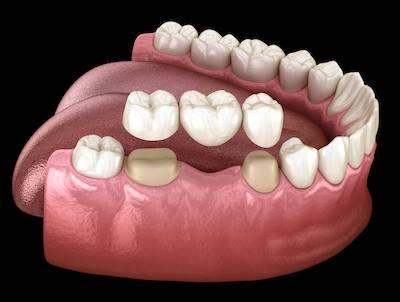
Dental Bridges in Parramatta
 Sometimes a tooth cannot be saved. This can be due to many reasons, such as trauma, damage, periodontal disease and more. Even though dedicated dentists try to save the tooth, in some cases, it just cannot be done. Having a missing tooth can affect you both medically and cosmetically. Missing teeth can cause speech problems and can affect your self-confidence.
Sometimes a tooth cannot be saved. This can be due to many reasons, such as trauma, damage, periodontal disease and more. Even though dedicated dentists try to save the tooth, in some cases, it just cannot be done. Having a missing tooth can affect you both medically and cosmetically. Missing teeth can cause speech problems and can affect your self-confidence.
You don’t have to live with missing teeth. At Painfree Dentistry, we offer a variety of tooth replacement options. We want you to be healthy and to be able to eat, talk, laugh and smile with confidence. One of the more popular and reliable treatment options is a fixed dental bridge.
What Is a Dental Bridge?
A dental bridge fills gaps in the smile. A custom-made tooth will be placed into the space where your natural tooth once was. The artificial tooth that will be used is called “pontics”. These act as a replacement tooth and will also stop your other teeth from shifting and tilting.
Traditional bridges require some preparation to the teeth adjacent to the missing tooth. A special crown will be placed on each one to act as an anchor. These will hold the artificial tooth in place. The crowns are made to match the rest of your tooth, so the finished result looks natural.
Are You Considering a Dental Bridge in Harris Park?
Stable Function
Improved Aesthetics
No Tooth Shifting
Our Team
-

Dr Elie Alam
Dr Alam graduated with a Bachelor of Dental Surgery from the University of Sydney in 1995. After working at various practices, Dr Alam opened his own practice in 1997 in Harris Park Village, located on the edge of the vibrant Parramatta CBD under the banner of Painfree Dentistry. The practice has grown to become the biggest privately owned practice in the Parramatta district, with seven dentists, an oral health therapist, and many supporting staff.
Dr Alam is passionate about learning innovations and using the latest technologies. With an increasing focus spanning ...
Read More
Benefits of a Dental Bridge
A bridge will stop your teeth from tilting and shifting. This is a great benefit because movement can cause problems for your other teeth and damage your bite. Bridges stabilise the bite, so you can comfortably talk and chew.
What to Expect When a Bridge Is Being Placed?
At the beginning of the process, your surrounding teeth will be reduced so that the bridge fits properly. A mould of your bite will be used to create the bridge. If you have chosen a porcelain bridge, it will be colour-matched to your natural teeth. You may also be fitted with a temporary bridge while the permanent one is being created.
Caring for Your Dental Bridge
Your dentist will discuss aftercare with you. However, here is some care information that you should know.
After the treatment, your teeth will need time to heal. You may feel sensitivity during the healing process, especially if your teeth are exposed to anything hot and cold. You may also feel soreness in the gums around your restorations. This will stop in a few days.
As with any treatment, it is very important to maintain your oral health. A bridge can be challenging to keep clean as food can collect around and under the bridge, making flossing under your artificial tooth and around the surrounding teeth very important. Your dentist might provide you with special dental floss so you can clean your teeth more thoroughly. As with all your teeth brushing is a necessity. Bad oral hygiene can lead to gum disease and the loss of more teeth.
Is A Bridge Right for Me?
If you have a missing tooth that still has natural teeth surrounding it, a bridge could be for you. You should speak to your dentist about tooth replacement procedures.
Maryland Bridge
There are many tooth replacement solutions available. One of the most popular treatments for missing teeth is the Maryland Bridge.
What is a Maryland Bridge?
A Maryland Bridge is a tooth replacement solution. The treatment gets its name from where it was created at the University of Maryland. This bridge is generally used to replace missing front teeth. A false tooth will be attached to metal bands. The bands are then hidden with white-coloured resin, which is then attached to the back of the teeth and on both sides. This bridge does not require a lot of preparation on the adjacent healthy teeth.
Advantages and Disadvantages of a Maryland Bridge
There are advantages to a Maryland Bridge that make this treatment better for some patients than other tooth-replacement methods. The benefits are:
- With this bridge, there is no need for any surgical procedures
- In some cases, no preparation of the adjacent teeth is required. If any prep work is needed, it will be minimal.
- Teeth are not trimmed down
- The Maryland Bridge takes less time than some other treatments, making it a quick fix.
As with most treatments, there may be some slight disadvantages. These are:
- The bridge is only supported by the adjacent teeth on the posterior side. This makes the treatment planning stage very important.
- The metal bands used may cause the teeth they are attached to go slightly darker in colour.
- The false teeth are made from porcelain in this treatment which may mean that the teeth may be lighter in colour than the surrounding natural teeth.
- Caring for and Maintaining Your Maryland Bridge
 Taking care of your bridge is very important. The dentist will discuss aftercare with you but here are some valuable tips.
Taking care of your bridge is very important. The dentist will discuss aftercare with you but here are some valuable tips.
Have Good Oral Hygiene – Taking care of your bridge and the rest of your teeth will keep your mouth healthier for longer. This also reduces the risk of having dental health issues in the future.
Brushing Teeth – When you have a dental bridge, it is a good idea to brush your teeth after every meal. This gets rid of any food stuck in between your teeth. If left, it could lead to infection. If you do end up with an infection, it will mean more dental treatment, resulting in the bridge being lost. Brush your teeth with a soft toothbrush and fluoride toothpaste.
Flossing – Flossing should be part of your routine. This stops the food from building up in between teeth and will enable you to clean places a toothbrush can’t reach.
Dental Cleaning – You should visit your dentist for a professional clean around twice a year.
Who Can Have a Maryland Bridge in Harris Park?
This bridge is an excellent choice for patients that are missing one front tooth. You will only be eligible to have this bridge if you have good oral hygiene. Smokers, patients with tooth decay and patients with unsuitable supporting teeth will not be offered the bridge.
Are You Interested in Dental Bridges?
If you would like to learn more about these reliable restorations and other cosmetic dentistry solutions, we welcome you to arrange a consultation with Painfree Dentistry.